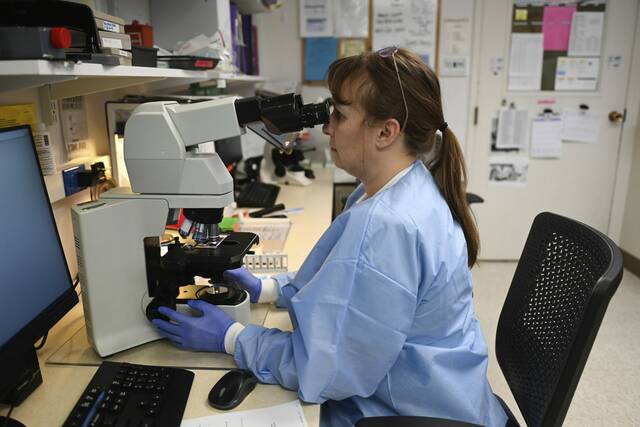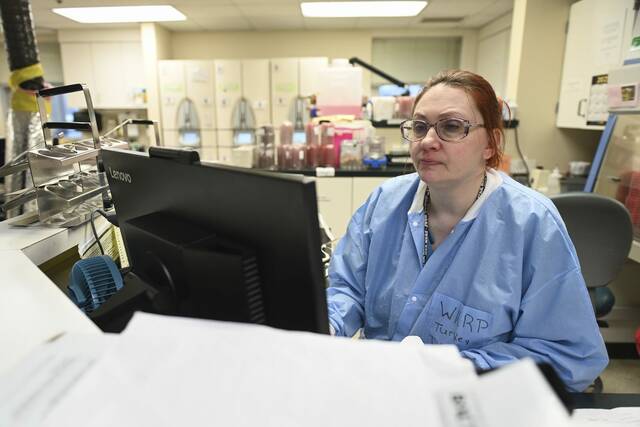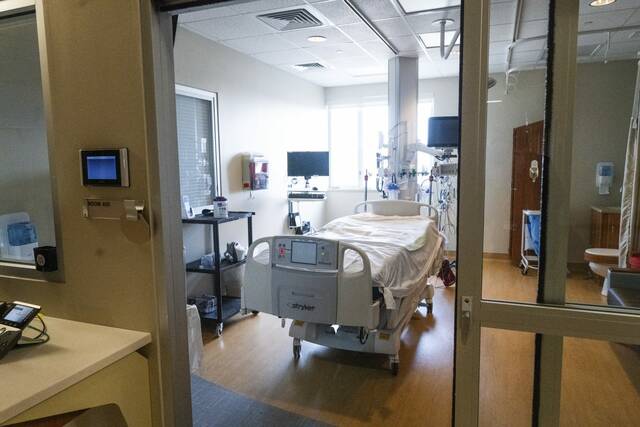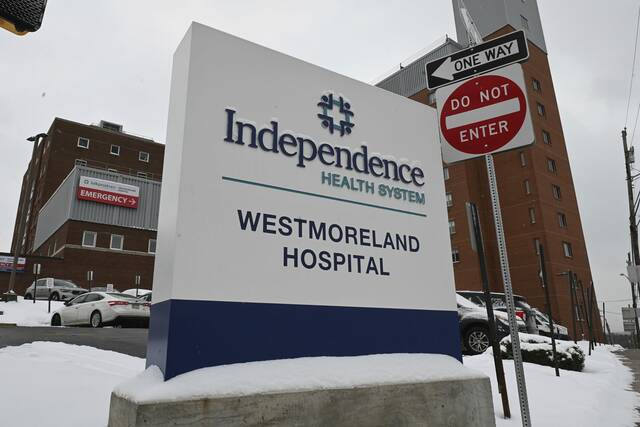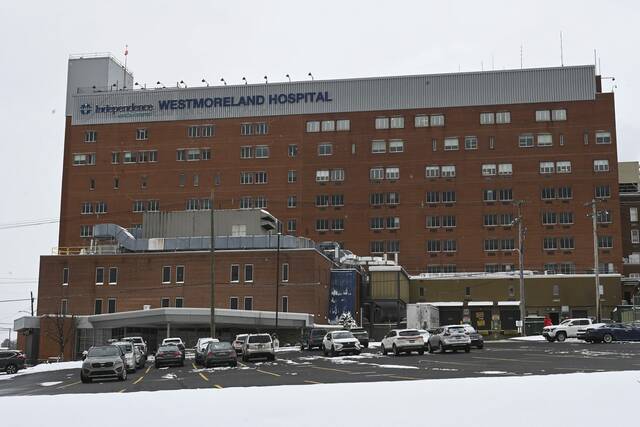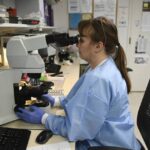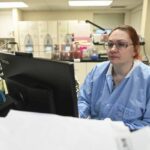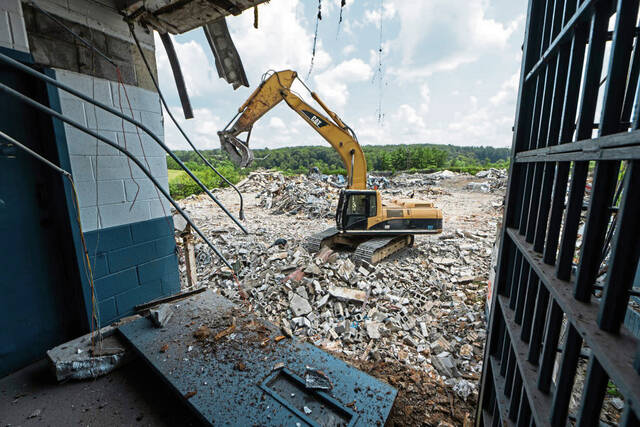Independence Health cut its operating losses by close to 50% in 2024, but those losses remain in the eight-figure range, prompting leaders of the regional health system to further reduce expenses.
Excela and Butler health systems combined in 2023 to create a third, albeit smaller, health care giant in a region that’s already home to UPMC and Allegheny Health Network, with hospitals and medical offices across Western Pennsylvania and beyond.
Independence Chief Financial Officer Tom Albanesi touted the subsequent reduction in financial losses in a recent interview and promised more to come.
“We intend on at least cutting it in half again in 2025,” Albanesi said.
Collaboration is key as Independence marks its second anniversary this month. Medical staffs that are spread across Butler, Clarion and Westmoreland counties are finding ways to work together, administrators say.
Independence reported operational losses of $74.1 million in 2023, and losses were about $41.4 million for the 12 months ending June 30, 2024.
Comparing the two halves of the Independence system, still assessed separately in fiscal reports, Butler Health brings the larger financial challenge. For the 12 months ending in June, operating losses of $29.8 million were attributed to Butler Health, while Excela Health had losses of $11.6 million.
“Our communities want to keep high-quality health care,” Albanesi said. “We’re going to keep pushing until we get where we need to go.”
By 2026, the goal is to improve its operating margin to slightly better than break-even, he said.
It plans to do this by making more cuts to reduce expenses by another 2.5%, Albanesi said.
Reimbursement shortfalls
One of the major challenges in getting the system’s operational balance sheet in the black, according to Albanesi, is that payments from government health care plans fall short of covering costs while accounting for 70% of the insurance reimbursements Independence receives.
“The Medicare reimbursement doesn’t quite cover our costs, and Medicaid doesn’t come close,” Albanesi said.
Some payors aren’t living up to their agreements when reimbursing Independence, he said.
“We had a wave of negotiations last year with some of our major payors,” he said. “It’s a cycle where there are always contracts coming up for renewal. We’re asking for increases to combat the inflationary environment we’re all experiencing.”
The physicians who are part of the Independence Health network face a similar problem with insurance reimbursements, according to Brian Fritz, president of Westmoreland, Latrobe and Frick hospitals.
“The level of reimbursement for physician services barely covers their salaries, let alone the salaries of their staff, overhead and the cost of professional liability insurance,” Fritz said. “It’s sad and demoralizing to our best and brightest.”
Medicare reimbursement rates for physicians are slated to undergo a 2.8% reduction in 2025, Fritz said.
Insurance reimbursements are just one of the factors affecting hospital finances in an environment that is especially challenging for smaller health care systems.
“It has become very complex,” said Barry Buckingham, executive director of the Pennsylvania Health Care Cost Containment Council.
“The issue is multifaceted,” he said. “How efficiently is the facility being run and how efficiently are they using their beds? Hospital services are by definition risky in that you may not either have enough patients or you may assume too many Medicaid patients, or too many may have nagging problems that are not allowing the doctors to release them.
“Part of it may be labor costs, depending on the nature of the facility.”
Buckingham noted a shortage of nurses has been a problem for the entire health care industry since the covid-19 pandemic.
“The hospitals with great resources were able to jack up the pay of the nurses, and the smaller hospitals had to follow suit,” he said. “You can’t pay people more in a crisis and then back it down later. Salaries don’t go down; they go up.”
Independence cut 226 positions in 2023.
“There have been no initiatives to reduce staff since (that) reduction, and there are none planned at this time,” Albanesi said.
Indications are that any future cuts likely would be among nonclinical staff positions.
“We value greatly the contributions made by our nonclinicians, but we have to be lean and look for opportunities to be efficient in those areas,” Albanesi said. “We prefer to do that through attrition.”
Staff who worked at Latrobe Hospital’s EPIC (Excela Physical Improvement Center) inpatient rehabilitation center were given opportunities to work elsewhere at the hospital or other campuses in the health system when that unit closed in August, according to Fritz.
The move was criticized by some patients and left Monroeville’s Forbes Hospital, operated by the competing Allegheny Health Network, one of the closest alternatives for inpatient rehabilitation.
Fritz indicated the Latrobe unit was underused.
“For a series of years, it had been under 50% occupied,” he said.
He noted a trend in the medical field favoring outpatient rehab, with difficulty in obtaining insurance authorization for providing the service on an inpatient basis.
“As the environment changes, we need to adapt with it,” he said.
The combined medical staff of the former Excela and Butler systems, including physicians and nurse practitioners, numbers a little more than 1,000, according to Dr. Carol Fox, chief medical officer of Independence.
Psychiatry and neurology are among areas where Independence needs more specialist physicians, Fox said.
“We’re always recruiting,” she said.
Skills shared among larger staff
Fox said collaboration between staff at the former Excela and Butler systems should benefit patients across the Independence service areas.
In the field of neurology, Fox said, Independence is offering an infusion therapy that is one of the newer methods for treating Alzheimer’s.
“It’s really giving patients hope,” she said. “It’s intended to actually create some improvement.”
Based in Westmoreland, “Dr. Mary Elizabeth Kovacik Eicher is taking the lead and is working with colleagues at Butler to ensure that these infusions are available to everyone across the system,” Fox said.
She said a similar cross-pollination is occurring in other areas, resulting in a broadened program of screening for lung cancer and sharing of physicians who specialize in caring for hospitalized patients.
“Hospitalists in Butler will cover shifts in Westmoreland County, and Dr. Eicher spends some time covering shifts in Butler,” Fox said.
In multiple disciplines, Fox said, “The physicians are really getting together and talking about what’s going well and how we can spread that across the system.”
With more skills to draw upon between the system’s two halves, diagnostic services that may have been farmed out to independent labs now can be handled in-house at a lower cost and with quicker turnaround.
“When we keep those things within the system, we can get results to patients more quickly,” Fox said.
With a combined system of five hospitals, Independence had increased flexibility this fall when Hurricane Helene flooded a plant in North Carolina that produces about 60% of IV fluids used in the country.
“We were able to work collaboratively and shared the supplies we have to ensure everyone had what they needed,” said Fox.
“As a larger organization, our purchasing power is a little better,” Fritz pointed out, a help when buying items as basic as paper supplies.
Updates at five hospitals
Since the merger of the Excela and Butler systems, some changes have occurred at their respective hospital campuses and more are planned.
While Latrobe Hospital has lost its inpatient rehab unit, the hospital will see an expansion of its adolescent behavioral health unit, set to debut in June. Fritz said the unit’s number of inpatient beds will increase from 11 to 23.
At the Westmoreland Hospital campus, in Greensburg, a redesigned outpatient cardiology facility opened in November. The bariatric surgical unit also is undergoing a revamp slated for completion next summer.
The hospital’s maternity center is getting an upgrade of its labor and delivery facilities, including wireless patient monitors and new beds and showers.
In June, Mt. Pleasant’s Frick Hospital gained a women’s health outpatient clinic that has since served more than 3,500 patients, according to Fritz. “It’s the first of its kind in Mt. Pleasant,” he said.
A short distance to the south, Independence in October 2023 opened The Square at Connellsville, offering primary care, lab and imaging services and other outpatient services in cardiology and orthopedics.
“In its first 14 months, it’s had over 13,000 patient visits,” Fritz said.
It joins similar outpatient facilities at Frick and in Unity and North Huntingdon.
Butler Hospital is renovating its drug and alcohol inpatient unit, which will gain two beds, according to Karen Allen, president of Butler and Clarion hospitals. The hospital also has gained a new CT (computerized tomography) imaging machine.
Butler Hospital’s Food Institute has expanded to Clarion Hospital.
“It’s identifying people with food insecurity,” Allen said. “They can learn about nutrition and how to make different foods economically.
“They’re also provided with some equipment if they’re lacking it. There are some people who don’t even have a can opener.”
Fox said help for patients with food insecurity also is offered at Frick.
“They’ll be sent home with a short supply of food to get them over the hump,” she said. “There are a lot of opportunities to implement some things in terms of helping people to optimize the (food) that they have, for their specific health condition.”
Data analysis highlighted
Physical facilities aren’t the only things getting an update.
Independence is partnering with Mitsui & Co. to develop Avehealth USA, a data platform company that will analyze patient medical and health system performance data with the goal of enhancing patient care.
“There are patients with certain conditions who need to have certain interventions done,” said Roger Lutz, chief information officer for Independence Health. “This is using technology to identify the patients, to gather them into certain cohorts and deliver reports or alerts to care managers to do outreach to those patients and make sure they’re getting all the care they need at the correct time and in the correct way.”
Independence Health’s investment in Avehealth will not be a financial one but will be in the form of expertise and insights provided by its clinical and operations staff, according to Lutz.
“We’re doing work on multiple initiatives right now and expect to be in production in 2025,” he said. “The long-term goal for the business of Avehealth is to create a valuable solution that can then be marketed as a business enterprise in and of itself.”
The venture’s goals also mesh with the concept of value-based care.
“The goal of value-based care is to have a better outcome for patients with the least amount of intervention,” Fox said, referring to those with chronic conditions such as diabetes or obstructive pulmonary disease.
“How can we better identify those folks early and provide care that’s effective and efficient, and slow the progression of their illness and lower some of the high costs that can be associated with waiting until their condition is very severe?” she said.
Said Albanesi: “We’ve taken the best of both prior health systems and have blended them together. Despite all the financial challenges, the future looks really bright for Independence and the communities we serve.”




